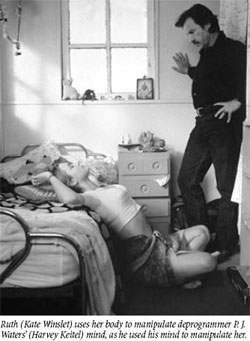Fourth Way Perspectives
Film Review
Avenging Angels
Holy Smoke
Directed by Jane Campion

"No one can be close to me," says Ruth Barron (Kate Winslet) during her deprogramming after having taken sannyas with Baba, her Indian guru. Fear of others is common in all, not just the characters in Jane Campion's new film Holy Smoke. Coming into another's energy field, we feel we have to be somebody, otherwise, we feel vulnerable. But always having to be a somebody, whatever role we take on or is given us, weighs us down, keeps us from experiencing that closeness human beings need. For, above all, we are social animals. To come together we think we have to forget ourselves. So we disappear into drugs, sex, and rock-and-roll, get caught up in the money-power dream.
"The mind is a mystery," says a minor character at the film's beginning. "We decide to diet in the morning and by lunch have forgotten all about it." Campion leaves it there, as if it's a mystery that hasn't been unraveled, and goes on to what really interests her: true relationship between man and woman. To explore this, she puts twenty-something Ruth in a shack in the Australian outback with sixty-something P. J. Waters (Harvey Keitel), an American "exit counselor" who has handled 189 cases with, as he brags, "only a three percent recidivistic rate." Waters' three-day program is: Day One, isolate her, get her attention, win her respect. Day Two, remove all the spiritual props, upset her, provoke her, let her see her anger—get her back into the animal nature. Day Three is supposed to be resolution but before this the situation has quickly become more than he's ever handled.
Turning the Tables
He tells the young girl—"The mind is a rebel. It is not a servant." And later after using her language of "soul," "the spark," "the path," he tells her "I don't want to disempower you." But this, of course, is exactly his aim. Psychologically speaking, he wants to break Ruth's rapport with and transference to the guru and return her to her previous life. In an amazing scene, Ruth, naked to herself, stands alone in the Australian night, stripped of all belief in anything. It is a dangerous point, for she stands now in between her new life and her old. She turns to face Waters nude underneath the raincoat he's covered her with. "The love is gone, it's all gone," she says forlornly. She steps out of her raincoat and wants to kiss him. He declines and puts the coat around her shoulders. She is so afraid, so alone, she urinates on herself. Understanding the depth and dangerousness of her fear, out of compassion and, yes, of course, lust, Waters lets her kiss him. She, giving herself to him entirely, seduces him and he experiences an intimate and intense communication with a woman beyond anything he has ever known. Unwittingly at first and later with some hint of intuition, she comes to realize she is his healing, as he is hers. A case of transference quickly becomes counter transference with this primal female. P. J. is intoxicated. The Ruth who has given herself to him is not the Ruth of the next day. She is angry at herself, at him, and asks sarcastically—"Which do you like best, my personality or my breasts?" To his credit and Campion's, he answers honestly. Ruth continues her assault, needling his insecurities and fears and using her body to play with his mind until he calls her, pathetically, "Man-hater!" Then Ruth, experiencing her power, having reduced him as he reduced her, tells him she wants to teach him how to kiss. "I know how to kiss," he protests. "Not as I like to be kissed, gently," she tells him. From there she leads P. J. beyond gender, putting him into a red dress, painting his lips. She asks who he is. "A dirty old man." She asks who she is. He takes her lipstick and writes backwards across her forehead so she can read it in the mirror—Be Kind. While their journey to "the bottom" of one another is "mixed," that is, both Ruth and P. J. seem to move from personality to essence and back, there is the sense of inner response and resonance from the other when both are truly exploring. For they touched each other, becoming close in a real way, beyond gender, beyond society, a wordless experience of mutual empathy, understandable only really to themselves. But Ruth still has her anger toward men. She wants dimensional relationship. And all men want is her body. She is treated not as a person but a thing. P. J.'s macho front, as we learn, hides his hostility and fear of women. He, too, was "opened" by an Indian guru who shocked and disgusted him by wanting to have sex with him. Hence his career. Campion (The Piano) might have gone deeper into the situation she has created, but one senses she went as far as she could go.

